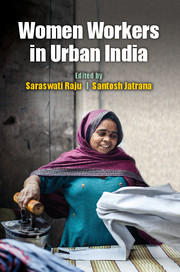Book contents
- Frontmatter
- Contents
- List of Figures
- List of Tables
- Preface
- 1 Setting the Backdrop
- 2 Women Workers in Urban India and the Cities
- 3 Gendered Vulnerabilities: Work-Life Trajectories of Female Domestic Workers in Jaipur
- 4 Occupational Domestication in a Post-Resettlement Context: An Analysis of Women's Work in Kannagi Nagar, Chennai
- 5 Old Jobs in New Forms: Women's Experiences in the Housekeeping Sector in Pune
- 6 Persistent Inequalities and Deepened Burden of Work? An Analysis of Women's Employment in Delhi
- 7 Spare Change for Spare Time? Homeworking Women in Banaras
- 8 Gender, Work and Space: Home-based Workers in Garment Industry in Kolkata
- 9 Labour Control and Responses: Women Workers in an Apparel Park in Kerala
- 10 New Urban Economic Spaces and the Gendered World of Work in Kolkata
- 11 Gender Equality and Women's Employment in the Banking Sector in India
- 12 Women Body Screeners and the Securitization of Space in Indian Cities
- Notes on Contributors
- Index
5 - Old Jobs in New Forms: Women's Experiences in the Housekeeping Sector in Pune
Published online by Cambridge University Press: 05 May 2016
- Frontmatter
- Contents
- List of Figures
- List of Tables
- Preface
- 1 Setting the Backdrop
- 2 Women Workers in Urban India and the Cities
- 3 Gendered Vulnerabilities: Work-Life Trajectories of Female Domestic Workers in Jaipur
- 4 Occupational Domestication in a Post-Resettlement Context: An Analysis of Women's Work in Kannagi Nagar, Chennai
- 5 Old Jobs in New Forms: Women's Experiences in the Housekeeping Sector in Pune
- 6 Persistent Inequalities and Deepened Burden of Work? An Analysis of Women's Employment in Delhi
- 7 Spare Change for Spare Time? Homeworking Women in Banaras
- 8 Gender, Work and Space: Home-based Workers in Garment Industry in Kolkata
- 9 Labour Control and Responses: Women Workers in an Apparel Park in Kerala
- 10 New Urban Economic Spaces and the Gendered World of Work in Kolkata
- 11 Gender Equality and Women's Employment in the Banking Sector in India
- 12 Women Body Screeners and the Securitization of Space in Indian Cities
- Notes on Contributors
- Index
Summary
Introduction
Neeta leaves her home every morning for her twelve-hour shift at 6.30 a.m. She walks for twenty minutes to get to her workplace. She is a housekeeper and her job involves dusting, washing dishes and cleaning washrooms in a large transnational firm. She is proud to be gainfully employed although she complains that she is paid Rs 700 less than her male colleagues. She does not have a bank account. She has heard that she is entitled to receive employer contributions to her PF (pension/provident fund) but does not know whether she has a PF account. Although she is proud to be employed and earning as much as her husband, her neighbours and relatives only know that she works in a company, as she has not told them the exact nature of her job. She dreams of providing higher education for her son and three daughters. Neeta, like other housekeepers working in transnational corporations, which have mushroomed in India, occupies the ambivalent position of privilege and precarity; she works in a place which is associated with the formal sector of the economy, while many of the terms of her employment remain informal (Agarwala 2013). Neeta's on-the-job learning involves not only understanding the tasks she must complete but also requires that she makes sense of the new social norms which define the gap between economically privileged white collar professionals and low wage women housekeepers like her. At the same time training is imparted in such a way that she learns that housekeeping is a new clean ‘profession’ and she has to be skilled to qualify as a professional. She is expected to move beyond caste-based stigmas that have been historically associated with cleaning jobs. As a contract employee, her employment relationship and place of work are not the same; she cleans the premises of a company with which she has no direct contract. This distance makes her job precarious as she can be immediately replaced. Yet, paid employment also allows her to challenge feudal relationships upon which domestic cleaning is based, and to see herself as a worker who knows about and evokes labour law. Neeta's experience suggests that ‘new’ sectors, such as professionalized housekeeping, which serves to maintain the ‘global’ nature of multinational firms in India with their ‘western’ codes of cleanliness and hygiene, both re-inscribe and challenge patriarchal gender norms.
- Type
- Chapter
- Information
- Women Workers in Urban India , pp. 121 - 138Publisher: Cambridge University PressPrint publication year: 2016
- 3
- Cited by



